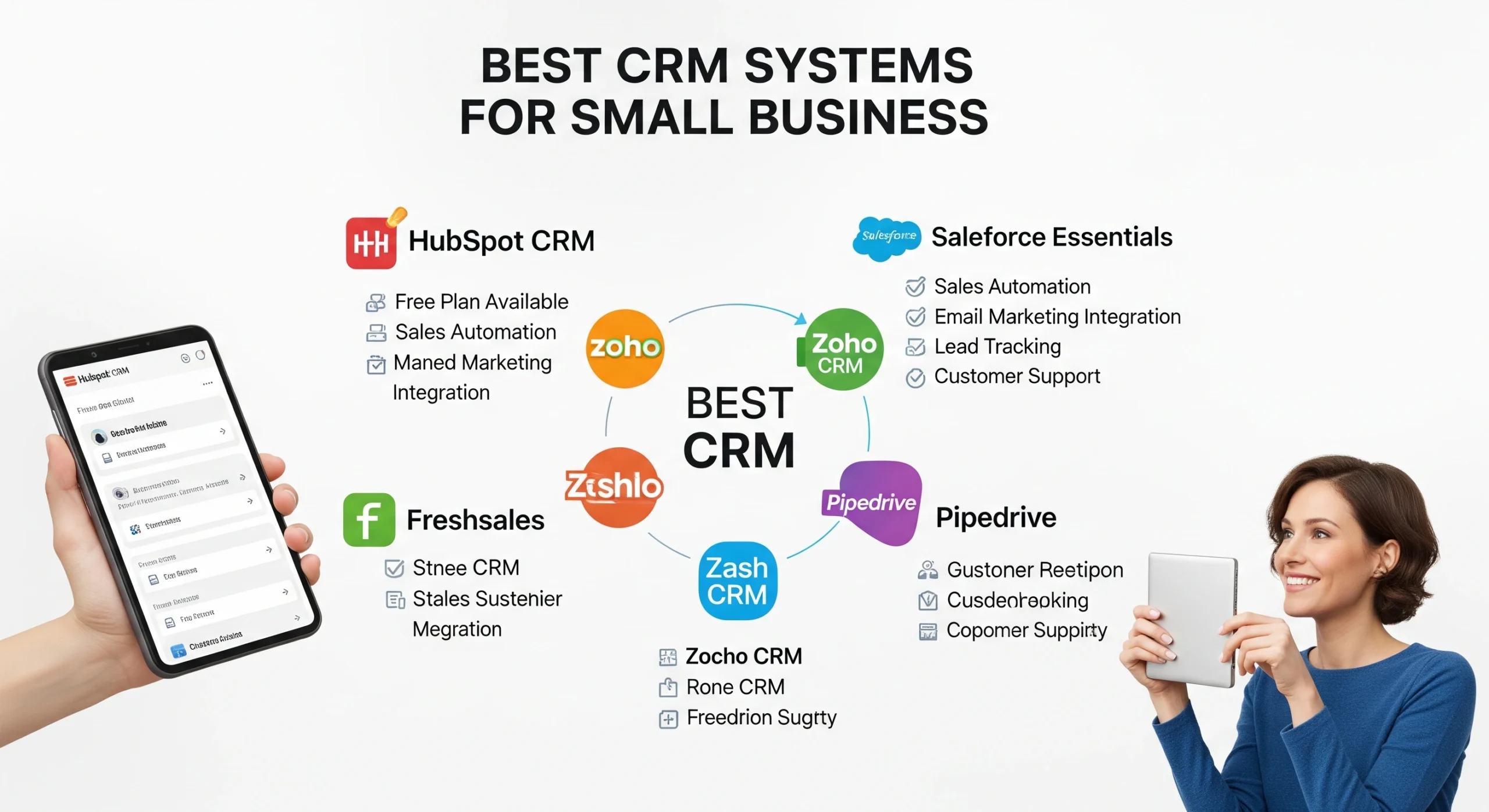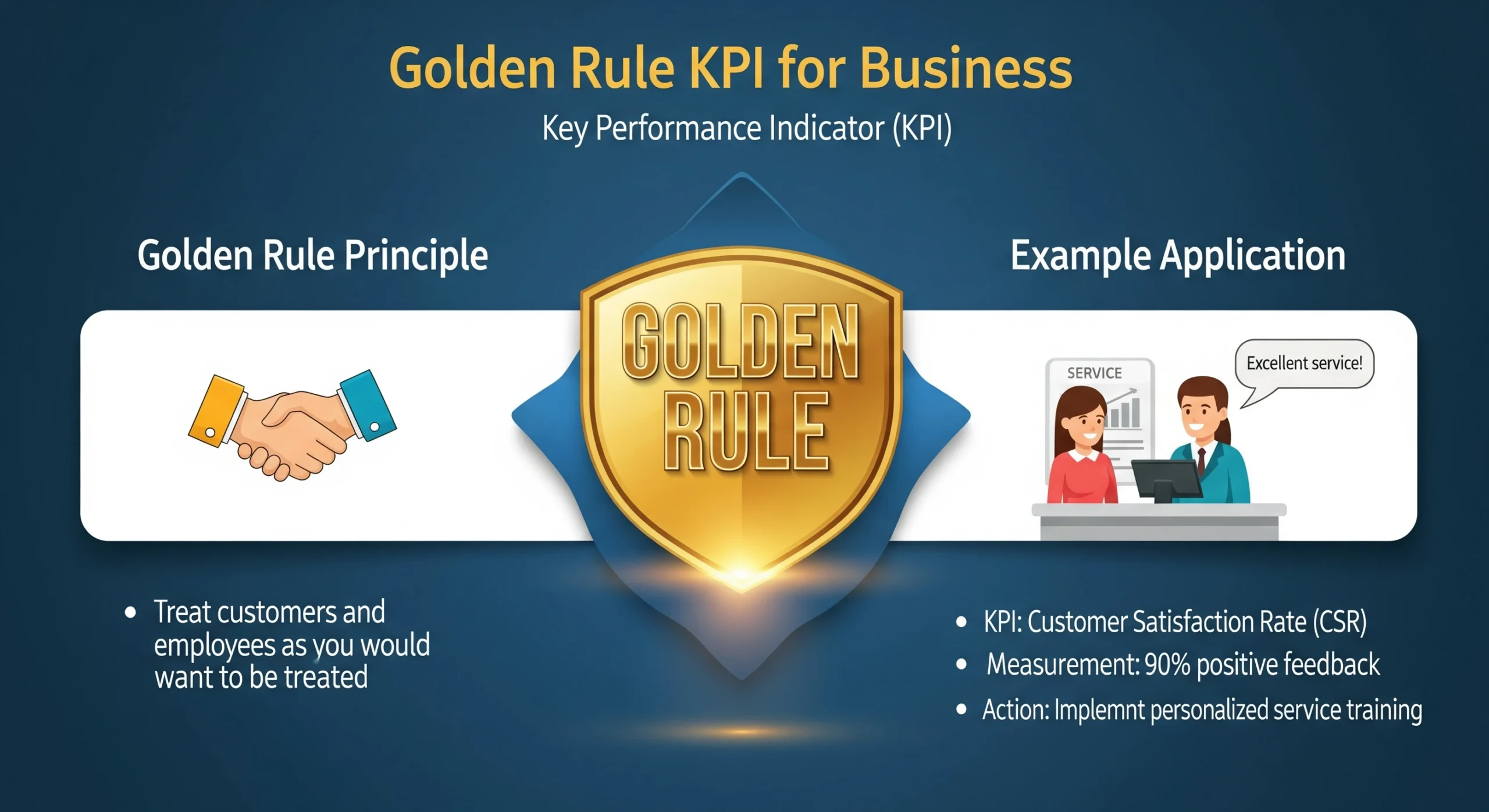in this page, you can learn top 10 best CRM Systems for small business. Basically, CRM is essential for small businesses because it helps manage customer relationships more efficiently, boosts sales, and improves customer satisfaction—all while saving time and reducing manual work.
Overview
Best CRM Systems for Small Business
I can help you compare CRM platforms based on your team size, budget, or industry—just say the word. Please Note: Without a CRM, small businesses risk losing leads, missing follow-ups, and struggling to maintain customer satisfaction. In contrast, businesses using CRM tools often see improved productivity, better customer retention, and faster growth.

Following top 10 CRM platforms for small businesses in 2025 include a mix of user-friendly, affordable, and highly customizable systems, each designed to help streamline operations, increase sales, and improve customer relationships.
10 Best CRM Systems for Small Business
Selecting the right Customer Relationship Management (CRM) software can significantly improve how small businesses handle customer interactions, automate routine tasks, and drive growth. In 2025, several CRM platforms stand out for their balance of affordability, functionality, and scalability.
1. HubSpot CRM
This CRM is one of the most powerful free CRM platforms available, making it a leading choice for small businesses that want to scale without upfront costs.
It seamlessly integrates marketing, sales, and customer service tools, offering features such as email tracking, deal pipelines, and contact management. With its extensive free plan, easy setup, and built-in marketing integrations, HubSpot provides an all-in-one solution for businesses seeking simplicity, efficiency, and long-term scalability.
Pros and Cons of Hubspot CRM
Pros:
- Generous free tier with robust, easy-to-use features
- Scalable platform that centralizes sales, marketing, and customer support
- Includes AI tools, drag-and-drop email builder, built-in SEO, chatbots, and strong automation and reporting capabilities
Cons:
- Free plan limited to two users and 1,000 contacts
- Advanced features and marketing tools available only on paid tiers
- Some customization options restricted in the free version
Pricing: Free for up to two users; paid plans start around $9–$20 per user per month
Best For: Small teams and startups seeking a centralized, scalable CRM with strong automation and marketing integration features.
Hubspot CRM System Requirements
App Types: Web-based, Android app, iOS app
Availability:
- Web: Accessible via any modern browser (Chrome, Firefox, Safari, Edge)
- Android: Available on Google Play
- iOS: Available on App Store
System Requirements:
- No installation needed for web
- Android 5.0+; iOS 9.0+
- Works on Mac and Windows via browser
2. Salesforce Essentials
This CRM is a trusted CRM built for small businesses yet powered by enterprise-level capabilities. It delivers deep analytics, robust automation, and powerful integrations right from the start. Designed for teams aiming for rapid growth, it provides scalability and advanced customization that seamlessly extend into the broader Salesforce ecosystem.
Although it has a learning curve, the platform’s flexibility and predictive insights make it an excellent choice for businesses planning to expand and optimize their operations.
Pros and Cons of Salesforce Essentials
Pros:
- Highly customizable and scalable with advanced workflow automation
- Integrates seamlessly with numerous business applications
- Offers AI-powered insights, strong reporting, and a vast ecosystem of add-ons
- Backed by a trusted brand known for powerful tools and reliability
Cons:
- Steeper learning curve; setup can be complex and may require expert guidance
- More expensive than many competitors
- Can feel overwhelming or excessive for teams with simple CRM needs
Pricing: Starts at approximately $25 per user per month
Best For: Small businesses planning for rapid growth that need robust customization, detailed analytics, and scalability.
Salesforce Essentials System Requirements
App Types: Web-based, Android app, iOS app
Availability:
- Web: Full access via browser
- Mobile: Salesforce app for Android and iOS
System Requirements:
- Android 8.0+; iOS 13.0+
- Chrome, Safari, Firefox, Edge supported
3. Monday CRM
This CRM is an ideal choice for teams seeking a flexible, visually driven platform that unites sales and project management in one place. It features drag-and-drop workflows, customizable pipelines, built-in automation, and seamless integrations with tools like Gmail and Outlook.
Designed for collaboration, Monday CRM helps small to mid-sized businesses streamline operations, boost productivity, and tailor processes to fit their unique workflows—making it perfect for teams managing both sales and operational tasks.
Pros:
- Combines CRM and project management in a single platform
- Highly visual, drag-and-drop interface for managing tasks and sales pipelines
- No-code workflow automation and extensive integrations (Gmail, Outlook, calendars, e-signatures)
- Fully customizable with unlimited pipelines and dashboards
Cons:
- Interface can feel overwhelming for users who prefer simpler layouts
- Limited built-in marketing features compared to all-in-one CRMs
- Additional add-ons can increase overall cost
Pricing: Starts at approximately $10–$12 per user per month
Best For: Teams seeking a visual, customizable CRM that integrates project and sales management while supporting flexible workflows.
Monday CRM System Requirements
App Types: Web-based, Android app, iOS app
Availability:
- Web: Full-featured dashboard
- Mobile: Android 8.0+; iOS 13.0+
System Requirements:
- Android app version 5.11.1+; iOS version 4.60+
- Browser access via Chrome, Firefox, Safari
4. Agile CRM
This CRM is a budget-friendly, all-in-one solution that unifies sales, marketing, and customer support on a single platform. Agile CRM offers powerful workflow automation, personalized marketing campaigns, and real-time collaboration tools—helping small businesses streamline operations and reduce costs by consolidating features.
While it’s highly efficient for smaller teams seeking integration and automation, it may feel limited for larger organizations with more complex workflow needs.
Pros and Cons Agile CRM
Pros
- All-in-One Solution: Combines sales, marketing, and customer service in a single dashboard.
- Affordable Plans: Offers a free tier and low-cost paid options, making it accessible for startups and small teams.
- Automation and Marketing Tools: Features email campaigns, lead scoring, visual workflow automation, and gamification to boost engagement.
- Integrations: Connects with popular platforms like Google Workspace, Mailchimp, and Shopify.
- Mobile Access: Available on Android and iOS for managing leads and tasks on the go.
Cons:
- Limited Free Plan: Supports only up to 10 users and lacks advanced automation features.
- User Interface: Can appear cluttered due to its wide range of features.
- Basic Support Tools: Customer service and reporting modules are less advanced compared to higher-end CRMs.
- Scalability: May not fully meet the needs of large enterprises or complex sales operations.
Pricing (2025)
- Free: $0 — Up to 10 users, basic CRM functionality
- Starter: ~$9/user/month — Email marketing and lead scoring
- Regular: ~$30/user/month — Marketing automation and integrations
- Enterprise: ~$49–$150/user/month — Advanced analytics, reporting, and API access
Agile CRM System Requirements
App Types: Website (SaaS), Android app, iOS app.
Platform Availability: Desktop browsers, Android, iOS.
System Requirements: Modern browser for web app; Android 6.0+/iOS 11+ recommended for mobile app; standard internet.
5. Zoho CRM
Zoho CRM offers a comprehensive set of features at an affordable price, making it ideal for tech-savvy teams that value customization and automation. Designed for businesses managing multichannel customer engagement, it provides robust reporting, flexible integrations, and scalable modules that grow with your needs.
Its adaptive platform supports everything from simple contact management to advanced marketing automation, all while integrating seamlessly with other Zoho applications—making it a top choice for small and medium-sized businesses seeking an affordable, scalable CRM solution.
Pros and Cons of Zoho CRM
Pros:
- Affordable, feature-rich all-in-one CRM platform
- Supports omnichannel engagement across email, social media, chat, and phone
- Includes AI-powered tools, automation, and a strong mobile app
- Highly customizable with flexible fields, reports, and dashboards
- Seamlessly integrates with other Zoho applications
Cons:
- Interface may feel basic or cluttered for advanced users
- Slight learning curve when using complex automation or customization features
Pricing: Free plan available for up to three users and 5,000 records; paid plans start around $9–$14 per user per month
Best For: Small and medium-sized businesses seeking an affordable, scalable, and customizable CRM with omnichannel communication and integrated business tools.
Zoho CRM System Requirements
App Types: Web-based (SaaS) platform with dedicated Android and iOS mobile applications
Platform Availability:
- Web: Compatible with Windows, macOS, and Linux via all major browsers
- Mobile: Available for download on Google Play and the Apple App Store
System Requirements:
- Web: Modern browser (Chrome, Firefox, Safari, or Edge) with a stable internet connection
- Android: Version 6.0 or later
- iOS: Version 10.0 or later
6. Freshsales by Freshworks
Freshsales is designed for sales-focused teams that value simplicity, speed, and intelligent automation. It features built-in phone and email tools for seamless outreach, along with AI-powered lead scoring to help prioritize high-value opportunities.
The platform offers an intuitive interface, customizable automation, and scalability to match business growth. Ideal for companies aiming to streamline pipeline management and improve lead conversion, Freshsales delivers a modern, easy-to-deploy CRM experience with a free starter plan to get teams up and running quickly.
Pros and Cons of Freshsales CRM
Pros:
- Built-in phone and email tools for seamless communication
- AI-powered lead scoring (Freddy AI) to prioritize high-value prospects
- Modern, clean, and intuitive interface
- Strong automation and multi-channel communication features
- Effective lead and pipeline management for growing teams
Cons:
- Limited integrations and customization in lower-tier plans
- Reporting tools not as advanced as enterprise-level CRMs
- Some premium features locked behind higher-priced tiers
Pricing:
Free plan available for up to three users; paid plans start around $9–$15 per user per month
Best For:
Small and mid-sized businesses seeking a modern, AI-driven CRM for streamlined lead management, sales automation, and pipeline tracking.
Freshsales CRM System Requirements
App Types: Web-based (SaaS) platform with dedicated Android and iOS mobile applications
Platform Availability:
- Web: Compatible with Windows, macOS, and Linux via modern browsers (Chrome, Firefox, Safari, Edge)
- Mobile: Available on both Android and iOS through their respective app stores
System Requirements:
- Web: Windows 7 or later / macOS 10.12 or later with at least 4 GB RAM
- Android: Version 7.0 or higher
- iOS: Version 13.0 or higher
7. Pipedrive
This CRM is an intuitive, sales-focused CRM designed to simplify pipeline management and boost team productivity. Its visual interface makes tracking deals straightforward, while automation tools handle repetitive tasks, saving valuable time. With quick onboarding, customizable workflows, and detailed reporting, Pipedrive CRM helps small and midsize businesses centralize sales data, streamline operations, and stay focused on closing more deals efficiently and affordably.
Pros and Cons of Pipedrive
Pros:
- Highly visual sales pipeline designed for sales-focused teams
- Simple and effective automation with AI-powered insights
- Integrates seamlessly with hundreds of third-party apps, including email and calendar tools
- Affordable entry-level pricing that suits small and mid-sized businesses
Cons:
- Limited marketing and campaign management capabilities
- Advanced reporting tools available only in higher-tier plans
- No permanent free plan offered
Pricing: Starts at approximately $14 per user per month
Best For: Sales-driven small and mid-sized businesses seeking an intuitive, visual CRM with strong pipeline management and automation features.
Pipedrive CRM System Requirements
App Types: Web-based (SaaS) platform with Android and iOS mobile applications
Platform Availability:
- Web: Works on Windows, macOS, and Linux through all major browsers
- Mobile: Available on Google Play and the Apple App Store
System Requirements:
- Web: Any device with a modern browser (Chrome, Firefox, Safari, Edge) and a stable internet connection
- Android: Version 7.0 or later
- iOS: Version 13.0 or later
- Hardware: Minimal requirements thanks to its cloud-based design
8. Salesmate
Salesmate is designed for businesses that prioritize efficient, multi-channel communication through calls, SMS, and emails—all managed within an intuitive Kanban-style pipeline. It’s an excellent choice for small teams focused on automation, streamlined outreach, and collaboration. With smooth integrations and a user-friendly onboarding process, Salesmate helps teams boost productivity and maintain consistent engagement across all customer touchpoints.
Pros and Cons of Salesmate
Pros:
- Kanban-style visual pipeline for effortless deal and workflow management
- Built-in multi-channel communication, including calls, texts, and emails
- Strong automation for sequences, follow-ups, and task management
- Smooth integrations with tools like Gmail, Calendly, and Zapier
Cons:
- Reporting and analytics features are relatively basic
- Multi-channel options may be excessive for smaller teams that don’t use text-based outreach
Pricing: Plans start at approximately $23 per user per month
Best For: Small sales teams focused on managing outreach efficiently across calls, SMS, and email within a unified, visual CRM system.
Salesmate Requirements and Availability
App Types: Web-based (SaaS) platform with dedicated Android and iOS mobile applications
Platform Availability:
- Web: Accessible through all major browsers on Windows, macOS, and Linux
- Mobile: Available on Google Play (Android) and the App Store (iOS)
Integrations:
Compatible with popular tools such as Google Workspace, Microsoft 365, Mailchimp, Shopify, Slack, and more
Industries Supported:
Construction, Real Estate, SaaS, Agencies, Consulting, Startups, and Remote Sales Teams
System Requirements
- Web: Latest versions of Chrome, Firefox, Safari, or Edge with a stable internet connection
- Mobile: Android 7.0+ or iOS 13.0+
- Desktop: Works on Windows 7+, macOS 10.12+, or any OS supporting modern browsers
- Recommended Specs: At least 4 GB RAM for optimal performance
9. BigConects
BIGContacts is an affordable, user-friendly CRM built for small businesses focused on contact management and email marketing. It offers customizable workflows, basic automation, and detailed activity tracking within a simple interface. While it may not include advanced features for complex operations, it’s ideal for small teams seeking an intuitive, reliable solution with strong contact management, built-in email tools, and responsive support.
Pros and Cons of BIGcontacts
Pros of BIGContacts
- Easy to Use: Intuitive interface designed for non-technical users with quick setup and simple navigation.
- Affordable: Budget-friendly plans starting at $9.99 per user per month, with a forever-free option for small teams.
- Email Marketing Built-In: Includes tools for email campaigns, drip sequences, and automation.
- Comprehensive Contact Management: 360° contact profiles, visual sales pipeline, and dynamic segmentation.
- Customizable Dashboards: Allows basic personalization of views and workflows.
- Reliable Support: Offers 24/7 live customer support for quick assistance.
Cons of BIGContacts
- Limited Advanced Features: Lacks deeper automation, AI capabilities, and advanced analytics found in larger CRM platforms.
- Mobile App Experience: Mobile functionality is more limited compared to leading competitors.
- Scalability Constraints: May not fully meet the needs of rapidly growing or enterprise-level organizations.
- Fewer Integrations: Limited compatibility with niche or specialized business applications.
Pricing: Free forever plan for small teams; paid plans start at $9.99 per user per month.
Best For: Startups, small businesses, and service providers seeking a simple, affordable CRM for managing contacts, basic automation, and email marketing in one easy-to-use platform.
BIGcontacts Requirements and Availability
App Types: Cloud-based web application (SaaS) accessible through any browser.
Platform Availability: Compatible with desktop browsers; no standalone Android or iOS app as of 2025.
System Requirements: Works on Windows, macOS, or Linux with a modern web browser such as Chrome, Firefox, Edge, or Safari.
10. Zendesk Sell
Zendesk is a streamlined sales CRM built to boost productivity through automation, pipeline management, and integrated communication tools. Designed for teams focused on efficiency and deal closure, Zendesk Sell simplifies the entire sales process with actionable insights and easy setup. Its clean interface and workflow automation make it an excellent fit for agile teams that prioritize speed and simplicity over complexity.
Pros and Cons of Zendesk Sell
Pros
- Clean, intuitive interface with quick onboarding
- Built-in dialer and full-featured mobile app for on-the-go teams
- Customizable drag-and-drop analytics dashboards
- Excellent for omnichannel communication (email, chat, social)
- Scales easily for growing teams
Cons
- Primarily focused on sales and support; marketing tools require add-ons
- Can get costly as you scale or add premium features
- Some advanced tools have a learning curve
Pricing Starts at $19/user/month
Best For: Sales and support teams seeking a streamlined, mobile-friendly CRM with strong communication and reporting features.
Zendesk Sell Requirement and Availability
App Types: Cloud-based web application (SaaS) with Android and iOS mobile apps.
Platform Availability: Accessible via browsers on Windows, macOS, and Linux, as well as Android (5.0+) and iOS (11.0+) devices.
System Requirements: Works with modern browsers like Chrome, Firefox, and Safari; requires a stable internet connection for optimal performance
Conclusion
Throughout our conversation, we explored the top CRM platforms for small businesses, comparing their features, pros and cons, pricing, system requirements, and industry suitability. From versatile options like HubSpot and Zoho to niche solutions like Less Annoying CRM and BIGContacts, each platform offers unique strengths tailored to different business needs.
We also covered app availability across web, Android, and iOS, and highlighted CRMs like Agile, Salesmate, and Zendesk Sell for their specialized capabilities. Whether you’re in retail, healthcare, real estate, or tech, there’s a CRM that fits your workflow and budget.
This guide equips you with the insights to choose the right CRM confidently and scale your business efficiently. Let me know if you’d like a personalized recommendation next.





Leave a Reply